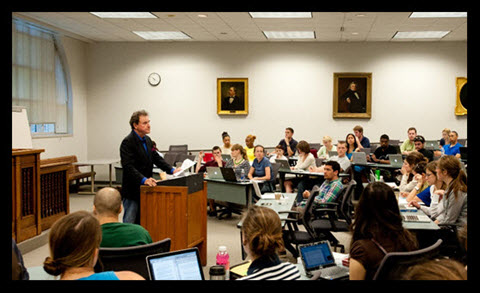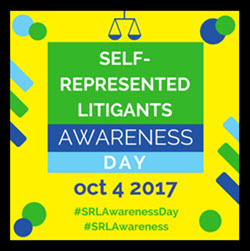People appeared without lawyers in BC Provincial Court 134,358 times in 2016/17. These “self-represented litigants” or “SRLs” face huge challenges that lawyers need to understand, but they also provide opportunities for lawyers to fulfill needs that aren’t being met. Three Ontario law schools held SRL Awareness Days this month for self-represented litigants and students to share thoughts and perspectives.
“This event aims to ensure that graduating law students are aware of the SRL crisis and have begun to think about how this will affect their future practice,” says Julie Macfarlane of the National Self-Represented Litigants Project.
Eight local SRLs spent a day at Osgoode Hall Law School in Toronto on October 4, 2017, offering students some insight into their experiences in the justice system. The highlight of Osgoode’s SRL Awareness Day, an initiative spearheaded by the National Self-Represented Litigants Project, was a panel discussion in which SRL Elizabeth Roberts and former SRL Randi Druzin joined two family lawyers in answering questions posed by students and a moderator.

The discussion touched on the many challenges SRLs face, from determining which forms they are required to complete to contending with sharp practice by lawyers, and on how lawyers are adapting to the needs of their clients by unbundling their services. The lawyers, Joel Miller and Sina Hariri, told assembled students that limited scope retainers (unbundled services) provide access to justice for people who can’t afford to hire lawyers on full-service retainers.
“One of the exciting things about unbundled services is the invitation for lawyers to re-think the way we create, price, and deliver discreet services so they can be both affordable and valuable for self-reps,” says Miller, who was called to the bar in 1970, and now has a practice devoted to providing fixed fee services by phone and email to family law SRLs. “One of the new doors this opens is the emerging field of legal coaching. That’s where the lawyer helps the self-rep to organize, prepare, and present their case in the most persuasive and effective way. This involves more than just answering legal questions and is new for lawyers — teaching self-reps how to do better without paying for full-fee services.”

The moderator, Angela Yenssen, described the event as “an important step towards improving the legal system. Raising law students’ awareness about the experiences of people in the legal system outside the legal profession creates the possibility that future lawyers, judges, and legislators will collaborate with litigants to design a more user-friendly legal system,” says Yenssen, a student at Osgoode.
“Hopefully, other opportunities will arise in future to expose more law students to the issues raised by the SRLs including ethical lawyering, inaccessibility of lawyers' services for middle income people, and the confusing labyrinth of legal procedures required for any court matter.”
Also that day, each SRL attended a lecture alongside students. Classes available to the SRLs included criminal law, tax law, refugee law and family law.
Roberts sat in on the family law lecture and was pleased that the professor included her and a fellow SRL in class conversation. “I really appreciated that,” she says. “I felt [the students and SRLs] got so much out of it. Students want to learn and SRLs, based on their experiences, have so much practical knowledge to share.”
The SRLs, who also met with Dean Lorne Sossin and Professor Martha Simmons, Director of the Osgoode Mediation Clinic and Academic Co-Director of the Winkler Institute of Dispute Resolution, wrapped up the day with a tour of the school.
“Young lawyers are increasingly interested in developing services for the primarily self-represented. We want law students to see the self-represented as who they really are — their neighbours, friends and colleagues who cannot afford full representation — and dispel the stereotype of crazy, intentionally disruptive wannabe lawyers,” says Julie Macfarlane, a law professor at the University of Windsor and director of the National Self-Represented Litigants Project, whose mandate is to advocate for a deeper understanding of the needs and motivations of SRLs and the challenges they face.
Professor Macfarlane hopes to extend the event to every law school in Canada. SRL Awareness Day was held at two other Ontario law schools – the University of Windsor and Western University - in early October, and future events are planned at the University of Ottawa and Queens University. There’s already talk in BC about holding SRL Awareness Days in 2018, and Access to Justice BC hopes to encourage it.
*Photo credits: National Self-Represented Litigants Project

